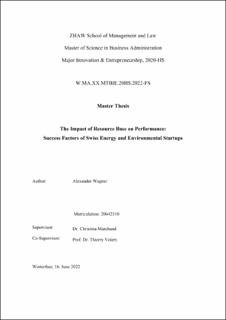Please use this identifier to cite or link to this item:
https://doi.org/10.21256/zhaw-27206| Publication type: | Master thesis |
| Title: | The impact of resource base on performance : success factors of Swiss energy and environmental startups |
| Authors: | Wagner, Alexander |
| Advisors / Reviewers: | Marchand, Christina Volery, Thierry |
| DOI: | 10.21256/zhaw-27206 |
| Extent: | 147 |
| Issue Date: | 2022 |
| Publisher / Ed. Institution: | ZHAW Zürcher Hochschule für Angewandte Wissenschaften |
| Publisher / Ed. Institution: | Winterthur |
| Language: | English |
| Subjects: | Resource-Bbased Vview (RBV); Startup performance; Startup success; Sucess factors; Predictors of performance; Predictors of success |
| Subject (DDC): | 658.1: Organization and finance |
| Abstract: | While few startups disproportionately contribute to innovative economic developments, most startups remain small or fail, even with substantial funding. Thus, precise support instruments are required for startups that are promising to achieve environmental objectives. The identification of success factors offers valuable insights for practice, research and policy making to enhance the low success rate. Drawing on the RBV, the effects of various resources and capabilities on the performance of Swiss energy and environmental startups are explored within a framework comprised by Financial Resources, Networks & Partnerships, and Team Capabilities & Knowledge. Besides the relative importance of elements of the resource base, moderating effects of Type of Main Offer, Technology Intensity and Phase in the Life Cycle are examined. A longitudinal secondary research design is used, drawing on a novel dataset of 108 startups, consisting of self-reported data from the Innovation Monitor surveys from 2018 to 2022, enriched by hand-collected data from desk research. A quantitative analysis is conducted by a series of moderated multiple linear regressions. Semi-structured interviews with seven founders are conducted to deepen the insights with a qualitative content analysis. Industry Partnerships were found to be a crucial success factor, particularly for high-tech startups, followed by founders’ experiences and an early Product-Market-Fit. While Managerial & Leadership Experience showed negative effects, Entrepreneurial and Industry Experience are less positive than prior research suggests. Technology and Industry Experience are valuable in the beginning but showed negative effects in the growth phase, while the opposite was observed for Marketing & Sales Experience. Whereas the Total Capital Raised was neutral, fundings from Corporate VCs and BAs were more effective than those of Independent VCs due to additional non-financial benefits. While the Phase in the Life Cycle showed the highest moderation potential, fewer moderations were identified for Technology Intensity and Main Offer. High relevance is awarded to External Factors, whereby Switzerland is considered as a conducive location. Drawbacks of a high salary level and small market can be resolved by International Activities which showed a positive effect. Derived from the findings, startups should aim for a fast product-market-fit, focus on key competencies, and adapt the team capabilities to the current phase. Building strong partnerships is paramount, ideally within an international business model. When looking for investors, non-financial values should be considered. Policy makers are encouraged to promote networking events and to be open for adjustment of regulations to foster innovative business models. Future research could use holistic frameworks to examine relationships between resources or study different identified effects and moderations in detail. Focused qualitative studies could investigate the causalities of the effects. For the Innovation Monitor it is suggested to conduct uniform surveys with mainly metric scales, and to continue the networking events which are considered valuable. |
| URI: | https://digitalcollection.zhaw.ch/handle/11475/27206 |
| License (according to publishing contract): | CC BY-NC-ND 4.0: Attribution - Non commercial - No derivatives 4.0 International |
| Departement: | School of Management and Law |
| Appears in collections: | MSc Business Administration |
Files in This Item:
| File | Description | Size | Format | |
|---|---|---|---|---|
| 2022_Wagner_Alexander_MSc_BA.pdf | 3.72 MB | Adobe PDF |  View/Open |
Show full item record
Wagner, A. (2022). The impact of resource base on performance : success factors of Swiss energy and environmental startups [Master’s thesis, ZHAW Zürcher Hochschule für Angewandte Wissenschaften]. https://doi.org/10.21256/zhaw-27206
Wagner, A. (2022) The impact of resource base on performance : success factors of Swiss energy and environmental startups. Master’s thesis. ZHAW Zürcher Hochschule für Angewandte Wissenschaften. Available at: https://doi.org/10.21256/zhaw-27206.
A. Wagner, “The impact of resource base on performance : success factors of Swiss energy and environmental startups,” Master’s thesis, ZHAW Zürcher Hochschule für Angewandte Wissenschaften, Winterthur, 2022. doi: 10.21256/zhaw-27206.
WAGNER, Alexander, 2022. The impact of resource base on performance : success factors of Swiss energy and environmental startups. Master’s thesis. Winterthur: ZHAW Zürcher Hochschule für Angewandte Wissenschaften
Wagner, Alexander. 2022. “The Impact of Resource Base on Performance : Success Factors of Swiss Energy and Environmental Startups.” Master’s thesis, Winterthur: ZHAW Zürcher Hochschule für Angewandte Wissenschaften. https://doi.org/10.21256/zhaw-27206.
Wagner, Alexander. The Impact of Resource Base on Performance : Success Factors of Swiss Energy and Environmental Startups. ZHAW Zürcher Hochschule für Angewandte Wissenschaften, 2022, https://doi.org/10.21256/zhaw-27206.
Items in DSpace are protected by copyright, with all rights reserved, unless otherwise indicated.